英语常用短语的用法与练习(17)
现在分词短语的用法及例句
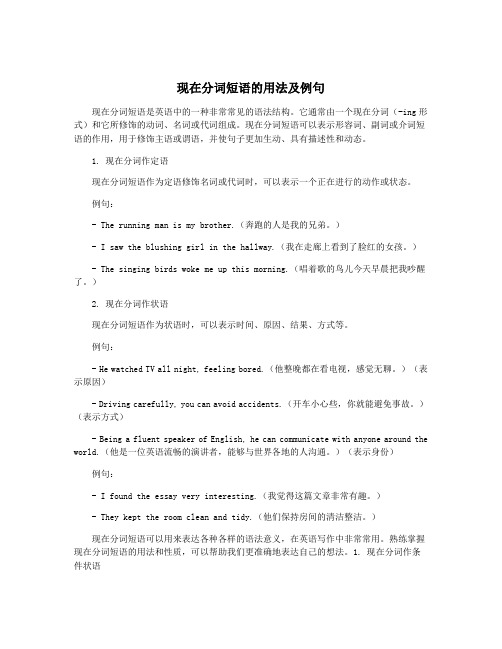
现在分词短语的用法及例句现在分词短语是英语中的一种非常常见的语法结构。
它通常由一个现在分词(-ing形式)和它所修饰的动词、名词或代词组成。
现在分词短语可以表示形容词、副词或介词短语的作用,用于修饰主语或谓语,并使句子更加生动、具有描述性和动态。
1. 现在分词作定语现在分词短语作为定语修饰名词或代词时,可以表示一个正在进行的动作或状态。
例句:- The running man is my brother.(奔跑的人是我的兄弟。
)- I saw the blushing girl in the hallway.(我在走廊上看到了脸红的女孩。
)- The singing birds woke me up this morning.(唱着歌的鸟儿今天早晨把我吵醒了。
)2. 现在分词作状语现在分词短语作为状语时,可以表示时间、原因、结果、方式等。
例句:- He watched TV all night, feeling bored.(他整晚都在看电视,感觉无聊。
)(表示原因)- Driving carefully, you can avoid accidents.(开车小心些,你就能避免事故。
)(表示方式)- Being a fluent speaker of English, he can communicate with anyone around the world.(他是一位英语流畅的演讲者,能够与世界各地的人沟通。
)(表示身份)例句:- I found the essay very interesting.(我觉得这篇文章非常有趣。
)- They kept the room clean and tidy.(他们保持房间的清洁整洁。
)现在分词短语可以用来表达各种各样的语法意义,在英语写作中非常常用。
熟练掌握现在分词短语的用法和性质,可以帮助我们更准确地表达自己的想法。
1. 现在分词作条件状语当现在分词短语与 if 或 when 连用时,可以表示一个条件或情况。
初中重要英语短语用法汇总
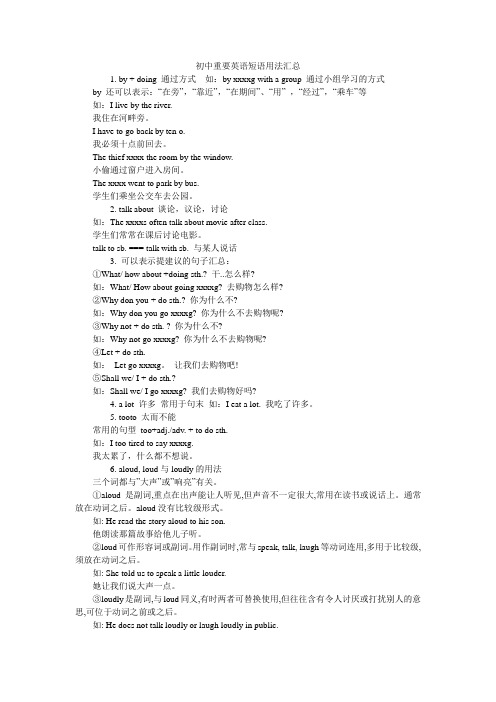
初中重要英语短语用法汇总1. by + doing 通过方式如:by xxxxg with a group 通过小组学习的方式by 还可以表示:“在旁”,“靠近”,“在期间”、“用” ,“经过”,“乘车”等如:I live by the river.我住在河畔旁。
I have to go back by ten o.我必须十点前回去。
The thief xxxx the room by the window.小偷通过窗户进入房间。
The xxxx went to park by bus.学生们乘坐公交车去公园。
2. talk about 谈论,议论,讨论如:The xxxxs often talk about movie after class.学生们常常在课后讨论电影。
talk to sb. === talk with sb. 与某人说话3. 可以表示提建议的句子汇总:①What/ how about +doing sth.? 干..怎么样?如:What/ How about going xxxxg? 去购物怎么样?②Why don you + do sth.? 你为什么不?如:Why don you go xxxxg? 你为什么不去购物呢?③Why not + do sth. ? 你为什么不?如:Why not go xxxxg? 你为什么不去购物呢?④Let + do sth.如:Let go xxxxg。
让我们去购物吧!⑤Shall we/ I + do sth.?如:Shall we/ I go xxxxg? 我们去购物好吗?4. a lot 许多常用于句末如:I eat a lot. 我吃了许多。
5. tooto 太而不能常用的句型too+adj./adv. + to do sth.如:I too tired to say xxxxg.我太累了,什么都不想说。
6. aloud, loud与loudly的用法三个词都与”大声”或”响亮”有关。
初中英语知识点归纳常见的动词和动词短语
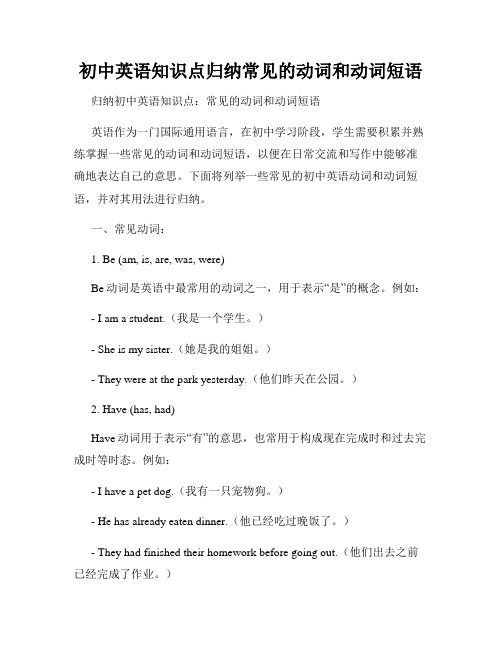
初中英语知识点归纳常见的动词和动词短语归纳初中英语知识点:常见的动词和动词短语英语作为一门国际通用语言,在初中学习阶段,学生需要积累并熟练掌握一些常见的动词和动词短语,以便在日常交流和写作中能够准确地表达自己的意思。
下面将列举一些常见的初中英语动词和动词短语,并对其用法进行归纳。
一、常见动词:1. Be (am, is, are, was, were)Be动词是英语中最常用的动词之一,用于表示“是”的概念。
例如:- I am a student.(我是一个学生。
)- She is my sister.(她是我的姐姐。
)- They were at the park yesterday.(他们昨天在公园。
)2. Have (has, had)Have动词用于表示“有”的意思,也常用于构成现在完成时和过去完成时等时态。
例如:- I have a pet dog.(我有一只宠物狗。
)- He has already eaten dinner.(他已经吃过晚饭了。
)- They had finished their homework before going out.(他们出去之前已经完成了作业。
)3. Do (does, did)Do动词常用于构成否定句、疑问句和一般疑问句等句子结构中。
例如:- I don't like coffee.(我不喜欢咖啡。
)- Does she play the piano?(她会弹钢琴吗?)- Did you go to the park yesterday?(你昨天去了公园吗?)4. Go (goes, went, gone)Go动词表示“去”的动作,也常用于构成进行时态和完成时态等句子。
例如:- I go to school by bus.(我坐公交车去上学。
)- She often goes swimming on weekends.(她经常在周末去游泳。
高中英语常用单词词组的用法和例句
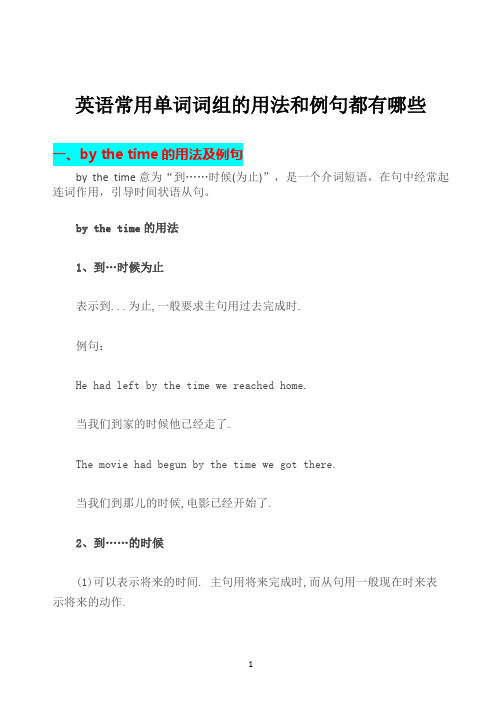
英语常用单词词组的用法和例句都有哪些一、by the time的用法及例句by the time意为“到……时候(为止)”,是一个介词短语,在句中经常起连词作用,引导时间状语从句。
by the time的用法1、到…时候为止表示到...为止,一般要求主句用过去完成时.例句:He had left by the time we reached home.当我们到家的时候他已经走了.The movie had begun by the time we got there.当我们到那儿的时候,电影已经开始了.2、到……的时候(1)可以表示将来的时间. 主句用将来完成时,而从句用一般现在时来表示将来的动作.I will have finished the work by the time my father comes back.(2)可以表示过去的时间. 主句用过去完成时,而从句用一般过去时.He had built a lab for himself by the time he was 12 years old.注:如果只是说过去某个时候的状况,用过去时,而不用完成时。
例句: By the time the war was over , death and suffering were to be seen everywhere.在战争结束的时候,到处可见死亡和饥饿。
这里没有“死亡和饥饿”已经完成的意思,只是描述当时这个时间点的状况。
所以用过去时。
二、beneficial的用法搭配及例句beneficial:形容词,意为有益的;有利的;有帮助的,侧重对健康、身心或事业有益。
beneficial后面通常加for 或to,构成搭配be beneficial for和be beneficial to。
1 beneficial的用法英[benɪ'fɪʃ(ə)l] 美[,bɛnɪ'fɪʃl]adj. 有益的,有利的;可享利益的例句:1、I have mentioned a number of times the beneficial effects of music playedto the unborn child.我已数次谈及给未出生孩子播放音乐的益处。
do的用法和搭配短语
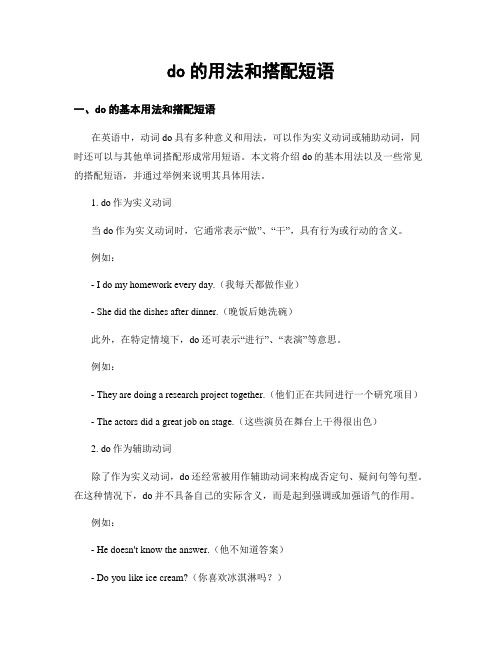
do的用法和搭配短语一、do的基本用法和搭配短语在英语中,动词do具有多种意义和用法,可以作为实义动词或辅助动词,同时还可以与其他单词搭配形成常用短语。
本文将介绍do的基本用法以及一些常见的搭配短语,并通过举例来说明其具体用法。
1. do作为实义动词当do作为实义动词时,它通常表示“做”、“干”,具有行为或行动的含义。
例如:- I do my homework every day.(我每天都做作业)- She did the dishes after dinner.(晚饭后她洗碗)此外,在特定情境下,do还可表示“进行”、“表演”等意思。
例如:- They are doing a research project together.(他们正在共同进行一个研究项目)- The actors did a great job on stage.(这些演员在舞台上干得很出色)2. do作为辅助动词除了作为实义动词,do还经常被用作辅助动词来构成否定句、疑问句等句型。
在这种情况下,do并不具备自己的实际含义,而是起到强调或加强语气的作用。
例如:- He doesn't know the answer.(他不知道答案)- Do you like ice cream?(你喜欢冰淇淋吗?)3. do的常见搭配短语do作为一个常见的动词,可以与其他单词或短语搭配使用,形成一些固定用法和习惯说法。
以下列举了一些常见的搭配短语:(1) do business:从事生意- He has been doing business in China for years.(他在中国做生意已经很多年了)(2) do favor:帮忙- Can you do me a favor and pick up my dry cleaning?(你能帮我一个忙去拿我的干洗吗?)(3) do harm:造成伤害- Smoking does harm to your health.(吸烟对身体有害)(4) do well:表现良好- She did well on her exam and got an A.(她考试考得很好,得了一个A)(5) do laundry:洗衣服- I need to do some laundry this weekend.(这个周末我需要洗点衣服)(6) do research:进行研究- He is doing research on new cancer treatments.(他正在进行新的癌症治疗方法的研究)二、do在不同场景中的具体用法除了以上介绍的基本用法和常见搭配短语,do在不同场景中还有一些特定的用法。
common的用法和短语
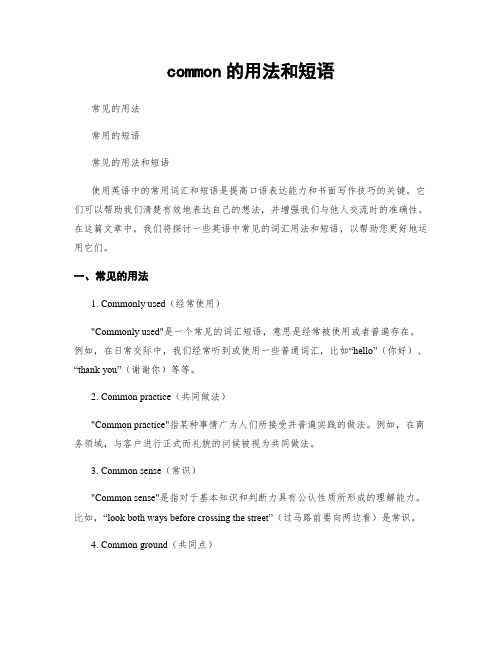
common的用法和短语常见的用法常用的短语常见的用法和短语使用英语中的常用词汇和短语是提高口语表达能力和书面写作技巧的关键。
它们可以帮助我们清楚有效地表达自己的想法,并增强我们与他人交流时的准确性。
在这篇文章中,我们将探讨一些英语中常见的词汇用法和短语,以帮助您更好地运用它们。
一、常见的用法1. Commonly used(经常使用)"Commonly used"是一个常见的词汇短语,意思是经常被使用或者普遍存在。
例如,在日常交际中,我们经常听到或使用一些普通词汇,比如“hello”(你好)、“thank you”(谢谢你)等等。
2. Common practice(共同做法)"Common practice"指某种事情广为人们所接受并普遍实践的做法。
例如,在商务领域,与客户进行正式而礼貌的问候被视为共同做法。
3. Common sense(常识)"Common sense"是指对于基本知识和判断力具有公认性质所形成的理解能力。
比如,“look both ways before crossing the street”(过马路前要向两边看)是常识。
4. Common ground(共同点)"Common ground"意指人们在某些观点上或兴趣上有共鸣和一致的地方。
例如,在职场中,找到共同点并与同事建立良好关系是非常重要的。
5. Common goal(共同目标)"Common goal"强调不同个体为了同一个目标而努力合作。
比如,在团队项目中,所有成员都会为实现共同的目标而努力工作。
二、常用的短语1. In common(共通)"In common"表示两个或多个对象之间具有相似之处或者特性。
例如,“Both Alice and Bob have a love of music in common”(爱丽丝和鲍勃都对音乐有共同的爱好)。
英语常用短语的用法与练习
英语常用短语的用法与练习(8)36. come into being 形成;产生,发生,出现(不可用于被动语态或进行时);例句:①We do not know when this world came into being. 我们不知道世界是何时形成的。
②When did the Roman Empire come into being?罗马帝国是什么时候形成的?③Magazines come into being to voice the new sentiments in the air.鼓吹新风尚的刊物纷纷问世。
短语:come into existence 形成;产生;开始存在;come into effect/ force/ operation开始生效;开始实施;come into use 开始被使用;come into power上台执政;come into fashion 开始流行;come into office 就职;come into action 开始行动;配套练习:单项填空:①Before the computer ____ , people could never imagine it could bring about such great changes to human life.A. came into beingB. was discoveredC. was come into beingD. was formed②Once a bad man comes into _____, the people of that country will suffer a lot.A. energyB. officeC. powerD. nation③It is said that this old building has _____ for more than three hundred years.A.existedB.appearedC.been builte into being④Do you know when did the world _____?A. come into beingB. comeC. formedD. existed37. come to life 复活;苏醒;变得活跃;恢复生气;例句:①I love to watch everything come to life in spring. 我喜欢看到春天万象更新。
高一(17)it的用法讲解、练习+七选五+完形填空+短文改错
高一(17)i t的用法讲解、练习+七选五+完形填空+短文改错-CAL-FENGHAI-(2020YEAR-YICAI)_JINGBIAN高一英语暑期复习材料(17)词汇巩固A New Farming Way 新的耕种方式Tuan was a farmer in Vietnam. For (decade), he had been (努力做)rid his family of hunger. However, it always (使……困惑) him how to expand the output of his crop s. This (disturb)problem (导致) his (regret) being a farmer. He (宁愿) have chosen another job.One day, when skim ming through a newspaper, Tuan read a comment on Yuan Longpin. He underline d Yuan’s nationality and occupation, and then (集中注意力) his discovery and the statistic s of his research. He found the knowledge Yuan circulate d very practical.(因此), he made a summary and began to (建立) a new farming method. He planted super grain of rich nutrition and (装备;配备) himself to keep his crops root s free from bacteria and pest s. He also enriched mineral s in the soil while_______________(reduce) chemical fertilizer s. Though it cost him more time and (free), he was full of hope.The next year, Tuan was sunburnt but (对……满意) his production very much.________________ (幸亏) Yuan Longpin, he not only won the battle against hunger, but he could also ___________(出口)his crops abroad.It的用法一、人称代词1,it的最基本用法是作代词,主要指刚提到的事物,以避免重复:①They watched the train until it disappeared in the distance.2.,也可以指动物或婴儿(未知性别的婴儿或孩子):②Is this your dog?No, it isn’t.③They got a baby and it was a ten-pounder3.,也可指抽象事物或指抽象环境和情景:③I hate it when people talk with a full mouth..二、.非人称代词1.it有时并不指具体的东西而泛指天气、时间、日期、距离、价值、度量、温度、环境等:⑴.指天气:It is a lovely day, isn’t it⑵.指时间: It was nearly midnight when she came back.⑶.指日期:It is April First today.⑷.指距离:It is some 3000 kilometers from Beijing to Guangzhou.⑸.指价值:It is three dollars.⑹.指温度:Today it is 30 degrees centigrade.三、其他用法1.在句子的主语不太明确时充当主语,表示谁在做某事:①Who is it thereIt's I (me/you/he.....).②I thought it was Mary, but it was not she.③Her face lighted when she saw who it was.2.泛泛的指某件事: (有时泛指一般情况)①It doesn’t matter.②It is a shame, isn’t it?③How is it going(情况怎样)④It says in the newspaper that......3.it用在一些词组中,it 没有特别的意思The last train's gone. Come on, we'll foot it.(来,咱们步行吧。
英语常用短语的用法与练习(3)
英语常用短语的用法与练习(18)86. leave out省去;遗漏;不考虑;例句:①You have left out the most important word in this sentence. 你在这一句中遗漏了最重要的一个单词。
②Don’t leave me out when you invite people to your party.当你邀请人们去参加聚会时,别把我漏掉了。
短语:leave for动身到(某处);leave alone不管;撇下……一个人;leave aside搁置;leave behind遗忘;遗留;配套练习:(1). 单项填空:①The printer has left _____ two lines from this paragraph.A. offB. outC. overD. with②It is not socially ___ for parents to leave children unattended at that age.A. accessibleB. adorableC. adaptableD. acceptable③I’ll be glad for you to leave me alone. I surely will. It’s none of my ___.A. affairsB. businessC. matterD. events④It’s better to call the children inside, it’s cold. Just ___. They are all enjoying themselves.A.leave them there where they areB. let them aloneC. leave them lonelyD. left them where they are(2). 用适当的介词或副词填空:①They were left _____ in the wilderness.②He was asked to make up the information left _____ by the leader.87. let out发出;放走;泄露例句:①Every time she moved her leg, she let out a moan. 每次她动一下腿,就会发出一声呻吟。
practise的短语和例句
practise的短语和例句一、Practise['præktɪs] vt.练习;训练;从事;信奉vi.执业;从业例句:I don't practise enough.(我练得还不够。
)I need to practise my Italian before my business trip.(我出差之前需要先练习一下意大利语。
)I strive to practise these two virtues in my life.(我在生活中努力实践这两种美德。
)Lots of practise is necessary for well-learning english. (要学好英语,大量的练习是必要的。
)Knowledge is a treasure, but practise is the key to it.(知识是一个宝库,而实践却是打开这个宝库的钥匙。
)practise的短语(使用中较少):practise in (v.+prep.)practise on [upon] (v.+prep.)二、practise和practice的区别1、practice英[ˈpræktɪs]n.练习;实践;(医生或律师的)业务;惯例;vi.实行;惯常地进行;练习;实习vt.实行,实践;执业;练习;惯常地进行例句:You need practice to improve your skills.(你需要实践来提高你的技巧。
)2、区别:(1)practice有两种词性,一种是名词(.n),一种是动词(.v),都是“练习”的意思。
(2)practise只有动词词性,用法和意思与practice相同,所以一般情况下用practice代替practise。
三、practice 的常用短语(用作名词):1、in practice在实践中例句:It's important to keep in practice.(经常练习很重要。
- 1、下载文档前请自行甄别文档内容的完整性,平台不提供额外的编辑、内容补充、找答案等附加服务。
- 2、"仅部分预览"的文档,不可在线预览部分如存在完整性等问题,可反馈申请退款(可完整预览的文档不适用该条件!)。
- 3、如文档侵犯您的权益,请联系客服反馈,我们会尽快为您处理(人工客服工作时间:9:00-18:30)。
英语常用短语的用法与练习(17)81. join in 参加;加入;例句:①Will you join me in a walk 你愿意和我一起散步吗②Let us join hands in friendship. 让我们携手共建友谊吧。
③They didn’t have enough time to join in the activity.他们没有足够的时间来参加这个活动。
join短语:join sb. in sth.与某人一起做某事;join up入伍;参军;join up with sb.与某人联合;会合;join hands with sb.与某人拉起手来;合伙;联合;辨析:join in/join/take part in/attendjoin in 参加正在进行着的活动。
如游戏、讨论、辩论、谈话等。
join ①参加某组织或团体,并成为其中一员;②来和某人待在一起。
take part in 参加会议或有组织的群众性活动,并在其中发挥一定的作用。
attend 正式用语,指参加会议、仪式、婚礼、葬礼、上课、上学、听报告等,句子的主语是去听去看,自己不一定起积极作用,相当于be present。
配套练习:(1).用join/join in/take part in/attend的适当形式填空:①I decided to ______ the club to have dance training.②Would you like me _______ to the game③I ________________ a meeting last month.④I will have to _________ his funeral next week.(2).选择题:①---Would you like to ______ us in this topic ---Yes, I’d like.in part in②Every student wants to _______ the class meeting.in part in③My brother _______ the Army for 3 years.joined joined in been in attended④I’d like to invite you to ________ my birthday pa rty.in part in⑤She will _______ an important meeting next month.in part in⑥Why not _____ an English club to practice _____ EnglishA.to join;to speak B.join;speakingC.join;to speak D.to join;speaking82. keep doing sth. 不停地做某事;例句:①When the teacher raised that question, I kept hoping that he would not ask me to answer it. 当老师提出那个问题时,我一直希望他不要让我来回答。
②In spite of the noise outdoors, she kept on reading. 她无视外面的嘈杂声,继续读书。
③His advice kept me from making a serious mistake. 他的忠告使我免于犯下一个严重的错误。
keep短语:keep+ adj. 保持……;keep+ n.+ adj./adv./n. 使(某人/某物)保持某种状态;keep+ sth. 保存某物;keep on doing 反复做……;keep sb. from doing 阻止某人做……;注意:keep/keep on一般都不能与表示短暂性动作、心理状态或结果的动词连用。
如:常不用keep(on)standing/sitting/beginning/leaving 。
配套练习:(1). 完成句子①Will you please _______ (保管这些钥匙) while I am away②This coat will _______ (让你暖和).③She _______ (让我等) for half an hour.④________ (不要乱动) while I photograph you.⑤He _______ (反复问) asking silly questions.⑥His girlfriend didn’t answer the phone, so Tom ____ (一直在想) why.(2). 单项填空:①Keep ______after meals, then you’ll be in good health.A. walkingB. sleepingC. standingD. sitting②I don’t allow ___ a fo ol of yourself by keeping on ___ the same question.A. to make; repeatB. making; repeatingC. to make; to repeatD. making; to repeat③Thank you for keeping me ___ of everything that’s happening. Don’t mention it.A. informB. informedC. informingD. information④My father always keeps me ___ while he himself keeps ___.A. smoking; smokingB. to smoke; to smokeC. from smoking; smokingD. from smoking; on smoking83. keep it up保持优秀成绩;继续干下去;例句:①Well done,and keep it up,Tom! 干得好,汤姆,再接再厉!②Keep it up! Final victory is in sight. 坚持下去! 最后胜利已经在望了.③There are fears that he will not be able to keep it up when he gets to the particularly demanding third year. 有人担心他到了要求极其严格的第3年时会坚持不下去。
keep短语:keep one’s head/temper保持冷静/强压怒火;keep a school/family/diary 开办学校/养家糊口/写日记;keep one’s word/keep one’s promise履行诺言;keep the law 守法;keep in touch with与……保持联系;keep an eye on ...照看;密切注视;keep up with跟上;保持同步水平不落后;keep away from (常与from连用)远离;不接触;keep to sth.信守;坚持;坚守;不违背(诺言、计划等);keep ...from(doing)sth.避开;禁止;克制;keep out 不让……进入; keep up 保持;配套练习:(1). 完成句子①We appeal to the government to _______ (降低) prices.②The police asked the people to ______ / ______ (远离) the scene of the accident.③Though things changed,they _______ (坚持;信守) the original purpose.④We asked her to stop talking,but she _______ (继续干下去).⑤He stopped at a shop for something,so he failed _______ (跟上) his associates and was left behind.⑥把你的狗从我这儿拿开! Keep _________ !⑦他总是说话算数的。
He always keeps _______ / _______ .⑧他对他的结论守口如瓶。
He kept ________ .(2). 单项填空:①—The windows are broken and need repairing.—I think so. They can hardly _____ the cold now.A. keep outB. give outC. take outD. put out②We read the newspaper every day to ______the present affairs.A. keep upB. keep up withC. catch up withD. keep in touch with③In face of failure for the moment ,it’s the most important to_____a good state of mind.A. keep onB. keep atC. keep upD. keep out④— I get at least half an hour of exercise almost every day.— Oh great! .A. Good luckB. Cheer upC. Same to youD. Keep it up84. lead to通向;导致;造成(后果);注意:lead to中的to为介词,该短语后可跟名词或动名词。
例句:①The car accident led to his being killed. 那次车祸导致他死亡。
②All roads lead to Rome. 条条大路通罗马。
③Eating too much sugar can lead to health problems. 吃太多糖会导致健康问题。
④His carelessness led to his failure. 他的粗心导致了他的失败。
lead短语:lead sb to do sth使某人做某事;in the lead = be ahead of 首位、最先;lead off (vi) 开始;lead into 引入、通向(可进入内部);lead somebody (in) doing something 领导某人做某事;result in导致;result from由……导致;配套练习:单项填空:①The students in the university are all taking courses _____a degree.A. sticking toB. leading toC. turning toD. referring to②In the countryside there are many dropouts (辍学者). I think the difficulty____ the poor economic conditions.A. lies inB. result inC. leads toD. suffers from③The famous scientist began the research which _____ his new discoveries.A. belonged toB. led toC. caused toD. brought to④The hotel was very different from what the advertisement_____ us to expect. We found that its conditions were terrible.A. madeB. shownC. ledD. told⑤The narrow passage _______ the big mountain for one mile.A. passes throughB. leads toC. leads on toD. reach85. leave ...alone丢下不管,不理会,不干涉, 不打扰;例句:①Leave me alone. 不要管我的事。
